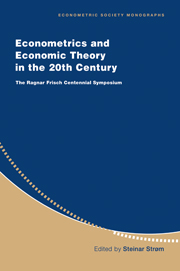Book contents
- Frontmatter
- PART I RAGNAR FRISCH AND HIS CONTRIBUTIONS TO ECONOMICS
- PART II UTILITY MEASUREMENT
- PART III PRODUCTION THEORY
- PART IV MICROECONOMIC POLICY
- PART V ECONOMETRIC METHODS
- 10 Scientific Explanation in Econometrics
- 11 An Autoregressive Distributed-Lag Modelling Approach to Cointegration Analysis
- 12 Econometric Issues Related to Errors in Variables in Financial Models
- 13 Statistical Analysis of Some Nonstationary Time Series
- PART VI MACRODYNAMICS
- PART VII MACROECONOMIC PLANNING
- Author Index
- Subject Index
10 - Scientific Explanation in Econometrics
from PART V - ECONOMETRIC METHODS
Published online by Cambridge University Press: 05 January 2013
- Frontmatter
- PART I RAGNAR FRISCH AND HIS CONTRIBUTIONS TO ECONOMICS
- PART II UTILITY MEASUREMENT
- PART III PRODUCTION THEORY
- PART IV MICROECONOMIC POLICY
- PART V ECONOMETRIC METHODS
- 10 Scientific Explanation in Econometrics
- 11 An Autoregressive Distributed-Lag Modelling Approach to Cointegration Analysis
- 12 Econometric Issues Related to Errors in Variables in Financial Models
- 13 Statistical Analysis of Some Nonstationary Time Series
- PART VI MACRODYNAMICS
- PART VII MACROECONOMIC PLANNING
- Author Index
- Subject Index
Summary
In this essay I shall give a formal account of the meaning of scientific explanations in econometrics. An explanation is an answer to a “why” question. It makes clear or intelligible something that is not known or understood by the person asking the question. A scientific explanation is an explanation in which the ideas of some scientific theory play an essential role. In econometrics this scientific theory is an economic theory, and the ideas of the theory are used to provide scientific explanations of regularities that econometricians have observed in their data.
There are all sorts of “why” questions, and usually many possible answers to a given question. The questions of interest here concern the occurrence of certain events, such as a sudden sharp drop in prices at the New York Stock Exchange, or the characteristics of observed phenomena (e.g., prolonged periods of severe unemployment in European economies). An answer to the first kind of question might list the causes of the event(s) in question. An answer to the second kind of question might list reasons why the observed phenomena are to be expected.
The form in which the causes of events and the reasons for observed phenomena are listed and used in a scientific explanation will vary among scientists even within a particular discipline. There is, therefore, a need for formal criteria by which we can distinguish between good and bad scientific explanations. These criteria must list the necessary ingredients of a scientific explanation and explicate the ideas of a logically adequate and an empirically adequate scientific explanation.
- Type
- Chapter
- Information
- Econometrics and Economic Theory in the 20th CenturyThe Ragnar Frisch Centennial Symposium, pp. 345 - 370Publisher: Cambridge University PressPrint publication year: 1999



